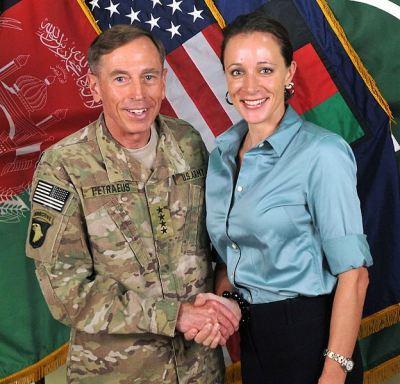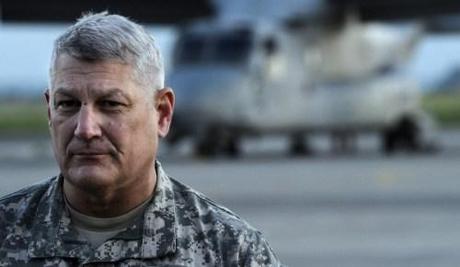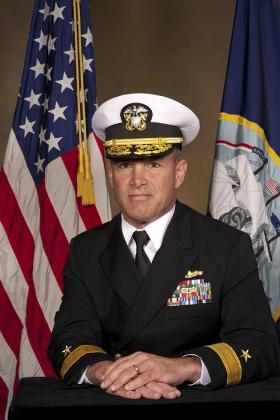Several days ago, FOTM’s lowtechgrannie posted a video of a media rarity — a reporter who doesn’t toe the party line and isn’t afraid to speak the truth. He’s Fox19 Cincinnati news anchor and investigative reporter Ben Swann.
At the end of the video, Swann noted that in the space of less than one month after the 7-hour Islamic terrorist attack of September 22, 2012, on the U.S. consulate in Benghazi, Libya, four high-level U.S. military flag officers had been removed, for one ostensible reason or another. The four are Generals Petraeus, Allen, and Ham, and Admiral Gaouette. (In the U.S. military, flag officers are general officers in the Army, Air Force, Navy, Marine Corps, and Coast Guard of such senior rank that they are entitled to fly their own flags to mark where the officer exercises command.)
Swann withheld speculating on what this quite unprecedented attrition of senior U.S. military officers means. But this attrition cries out for some effort at explanation, no matter how speculative.
We’ll begin with the facts that we’ve been told.
1. General David Petraeus

Gen. Petraeus and Paula Broadwell
A highly-decorated four-star general who had served over 37 years in the U.S. Army, 60-year-old David Petraeus had been Commander of the International Security Assistance Force; Commander of U.S. Forces Afghanistan; 10th Commander, U.S. Central Command; and Commanding General of Multi-National Force – Iraq who oversaw all coalition forces in Iraq.
On September 6, 2011, Obama recruited Petraeus to be Director of the Central Intelligence Agency. A week before, in anticipation of that appointment, Petraeus had retired from the U.S. Army.
Petraeus lasted 14 months as CIA director. On November 9, 2012, he resigned from the CIA, citing his extramarital affair with Paula Broadwell, a married woman who is the principal author of Petraeus’ biography, All In: The Education of General David Petraeus. Petraeus claims that the affair had begun in late 2011 when he was no longer an active duty military officer, and ended in the summer of 2012. The affair reportedly was discovered in the course of an FBI investigation into harassing emails that Broadwell had been sending to Jill Kelley, a Tampa socialite and a longstanding family friend of the Petraeuses whom Broadwell perceived to be a romantic rival.
2. General John R. Allen

Gen. Allen (l); Jill Kelley (r)
A four-star general of the U.S. Marine Corps, 58-year-old General John Allen had succeeded Petraeus as Commander of U.S. Forces Afghanistan on July 18, 2011. He was nominated to be NATO’s Supreme Allied Commander, Europe, pending confirmation by the United States Senate.
As part of the fallout of the Petraeus-Broadwell affair, correspondence between Allen and Jill Kelley also came to light. The FBI reportedly uncovered 20,000 to 30,000 pages of correspondence — mostly email — between Allen and Kelley from 2010 to 2012. Reportedly, their correspondence was “flirtatious” and “inappropriate” as Allen and Kelley are both married, but not to each other. (Good grief. How could a 4-star general even have so much free time as to write 20,000 to 30,000 emails in the space of two years to ANYONE?)
On November 13, 2012, Defense Secretary Leon Panetta suspended Allen’s confirmation hearing, pending investigations into the general’s “inappropriate communication” with Kelley. Panetta also requested Congress to speed the confirmation of General Joseph Dunford to take over as commander of U.S. forces in Afghanistan. In effect, not only will Allen not be promoted, he has lost his present command post in Afghanistan.
3. General Carter F. Ham

A well-decorated U.S. Army general, 60-year-old Ham became Commander of U.S. Africa Command (AFRICOM) on March 8, 2011.
U.S. AFRICOM is one of nine Unified Combatant Commands of the U.S. Department of Defense (DoD). As one of six that are regionally focused, AFRICOM is devoted solely to Africa. James S. Robbins of The Washington Times writes that Gen. Ham “is a very well regarded officer who made AFRICOM into a true Combatant Command after the ineffective leadership of his predecessor, General William E. ‘Kip’ Ward.”
On October 18, 2012, in a DoD news briefing, Defense Secretary Leon Panetta announced that Gen. Ham was relieved fired: “Today I am very pleased to announce that President Obama will nominate Army Gen. David Rodriguez to succeed Gen. Carter Ham as commander of U.S. Africa Command.”
According to Joint doctrine, “the tour length for combatant commanders and Defense agency directors is three years.” But Gen. Ham had only been in the commander position at AFRICOM for a year and a half and the informal word was that he wasn’t scheduled to rotate out until March 2013.
Pat Dollard of BareNakedIslam claims that the scuttlebutt is that, on September 11, 2012, Gen. Ham had received the same e-mails the White House received — from our people in Benghazi, requesting help/support as the terrorist attack was taking place. Ham immediately had a rapid response unit ready and communicated to the Pentagon that he had the unit ready. Dollard writes:
“General Ham then received the order to stand down. His response was to screw it, he was going to help anyhow. Within 30 seconds to a minute after making the move to respond, his second in command apprehended General Ham and told him that he was now relieved of his command.”
Gen. Ham’s “second in command” is not named. The Pentagon’s official line is that Ham had retired.
4. Rear Admiral Charles M. Gaouette

Rear Admiral Charles Gaouette
The recipient of various personal decorations and unit awards, including the Vice Admiral James Bond Stockdale Award for inspirational leadership in 2003, Rear Admiral Charles Gaouette was promoted to Commander of Carrier Strike Group 3 (aka John C. Stennis Carrier Strike Group) in April 2012.
Carrier Strike Group 3 is one of five U.S. Navy carrier strike groups currently assigned to the U.S. Pacific Fleet. U.S. Navy carrier strike groups are employed in a variety of roles that involve gaining and maintaining sea control and projecting power ashore, as well as projecting naval airpower ashore.
The aircraft carrier USS John C. Stennis is the strike group’s current flagship, and as of 2012, other units assigned to Carrier Strike Group 3 include Carrier Air Wing Nine; the guided-missile cruisers USS Mobile Bay and USS Antietam; and the ships of Destroyer Squadron 21, the guided-missile destroyers USS Wayne E. Meyer, USS Dewey, USS Kidd, and USS Milius.
Carrier Group Three formed the core of the naval power during the initial phase of Operation Enduring Freedom in 2001. “Operation Enduring Freedom” is the official name used by the U.S. government for the War in Afghanistan, together with a number of smaller military actions, under the umbrella of the Global “War on Terror”. On 16 July 2012, the U.S. Department of Defense announced that the scheduled deployment of Carrier Strike Group Ten was advanced by four months, with its anticipated area of operation shifting from the U.S. Seventh Fleet in the Western Pacific to the U.S. Fifth Fleet in the Persian Gulf and North Arabian Sea. On 27 August 2012, four months ahead of schedule, Carrier Strike Group Three departed for an eight-month deployment to the U.S. Fifth Fleet under the command of Rear Admiral Charles M. Gaouette.
On October 27, 2012, the commander of the U.S. Fifth Fleet, Vice Admiral John W. Miller, ordered the temporary re-assignment of Rear Admiral Charles M. Gaouette pending the results of an investigation by the Naval Inspector General. Gaouette’s chief of staff, Captain William C. Minter, will lead the strike group until the arrival of Rear Admiral Troy M. (“Mike”) Shoemaker, who will assume command of the strike group.
Tom Lombardo writes for the Navy Times, Oct. 27, 2012, that Adm. Gaouette was relieved, mid-deployment, and is accused of “inappropriate leadership judgment,” according to a Navy official familiar with the case. Gaouette was told to go home — to return to the Carrier Strike Group’s homeport in Bremerton, Washington, until the investigation is complete.
∞
There you have it. Within two months after the Benghazi attack, four senior U.S. military officers were purged:
- Gen. Ham, on October 18.
- Adm. Gaouette, on October 27.
- Gen. Petraeus, on November 9.
- Gen. Allen, on November 13.
Ostensibly, Petraeus’ “retirement” and Allen’s suspended promotion are due to both men’s moral conduct. But surely we are not so naive as to think that Petraeus and Allen are the only U.S. military officers who’ve ever committed adultery or written flirtatious email. As for Ham’s “retirement” and Gaouette’s “temporary re-assignment” (reassignment to what?), there is not even a whisper that either man’s morals or personal conduct is at issue.
So what should we make of all this? Is it all just coincidence or something more sinister?
Ann Barnhardt, in her blog of Nov. 13, 2012, calls it Obama’s “night of the long knives.”
The last step in Hitler’s quest for total, dictatorial power was the purging of the German military of any factions that were in any way autonomous and not 100% loyal to him, specifically the SA (Sturmabteilung or Storm Detachment). The SA was run by Ernst Rohm. On June 30, 1934, the “Night of the Long Knives” was executed when Hitler had Rohm and the rest of the SA leaders killed. Hitler publicly explained that the purge was executed because of sexual perversion in the ranks of the SA who were “plotting” against him.
Barnhardt writes:
And now, the Obama putsch regime is purging them and anyone else they deem to be a threat. It won’t surprise me if Petraeus is indeed court martialed and stripped of his pension, because that is what the rest of the flag officer corps fears more than death. Make an example of Petraeus, and maybe Allen, and that will whip the rest of them into line.
This process of a totalitarian oligarchy constantly purging its own ranks in fits of paranoia and demands for total personal loyalty is as old as the hills. Lenin and Stalin eventually murdered almost every person that entered their inner-circles. Same with Mao. Same with Saddam Hussein. Same with the three Kims in North Korea. Beyond the Night of the Long Knives, Hitler was also having his own people killed continuously.
Just as the Night of the Long Knives in ’34 was just the beginning, so too is this situation in the former American republic just the beginning.
Writing for Veterans Today, Gordon Duff has an even more provocative take on the four military officers:
The decision [to fire Admiral Gaouette] was made based on a conversation with the Secretary of Defense who, at the end of the talk, believed Gaouette was part of a group of military officers who have been under suspicion for planning a “Seven Days in May” type overthrow of the US government if President Obama is re-elected.
This is not conjecture, dozens of key officers face firing, hundreds are under investigation, all with direct ties to extremist elements in the Republican Party and the Israeli lobby.
Reports received are sourced at the highest levels of the Pentagon and indicate that the administration has been aware of these plans for months.
Whatever the truth, one thing of which we can be sure is that the firings of three generals and an admiral have something (or everything) to do with the Benghazi attack. It’ll be interesting if the newly-elected 113th U.S. Congress will conduct serious investigations and hearings on Benghazi, although Sen. Marco Rubio (R-Florida) is already on record as being opposed to an independent investigation.
I wouldn’t hold my breath….
Click here for Part 2 of “Obama purges U.S. military command”.
~Eowyn

